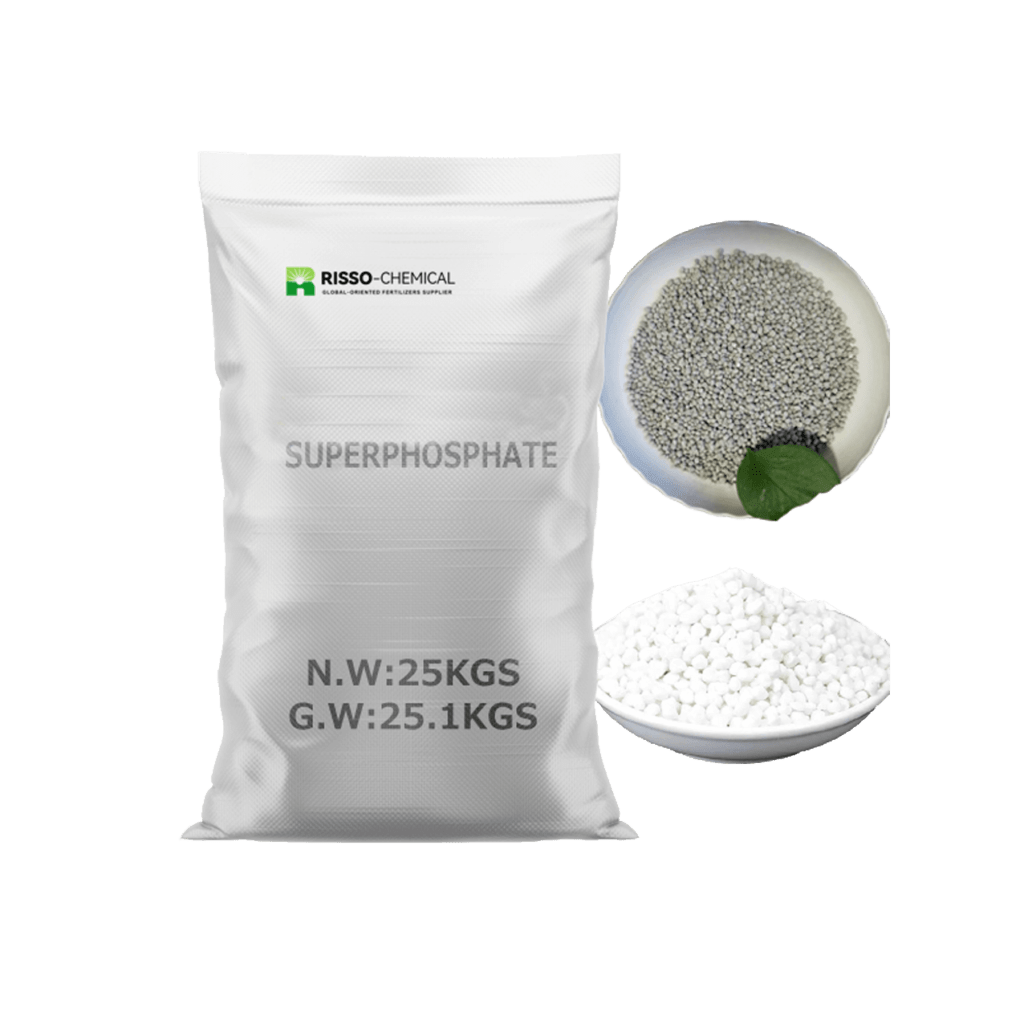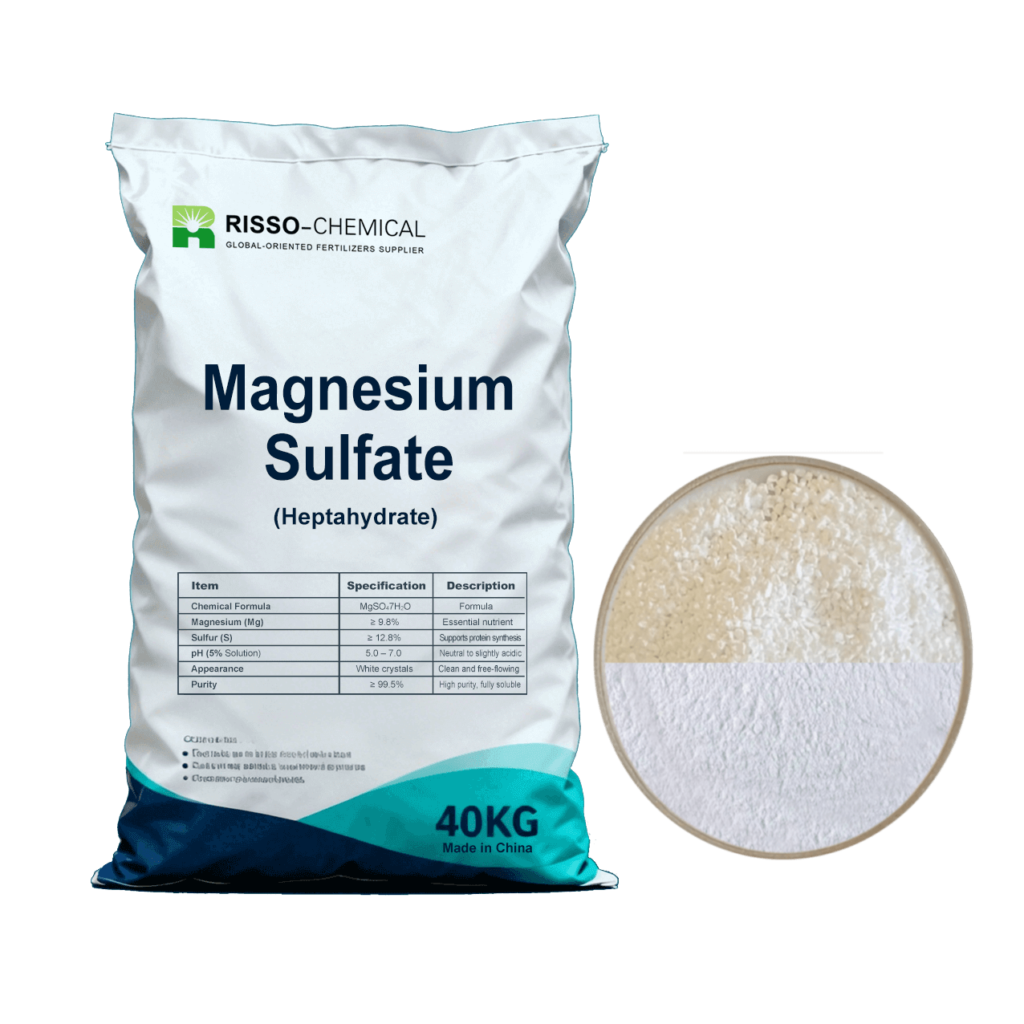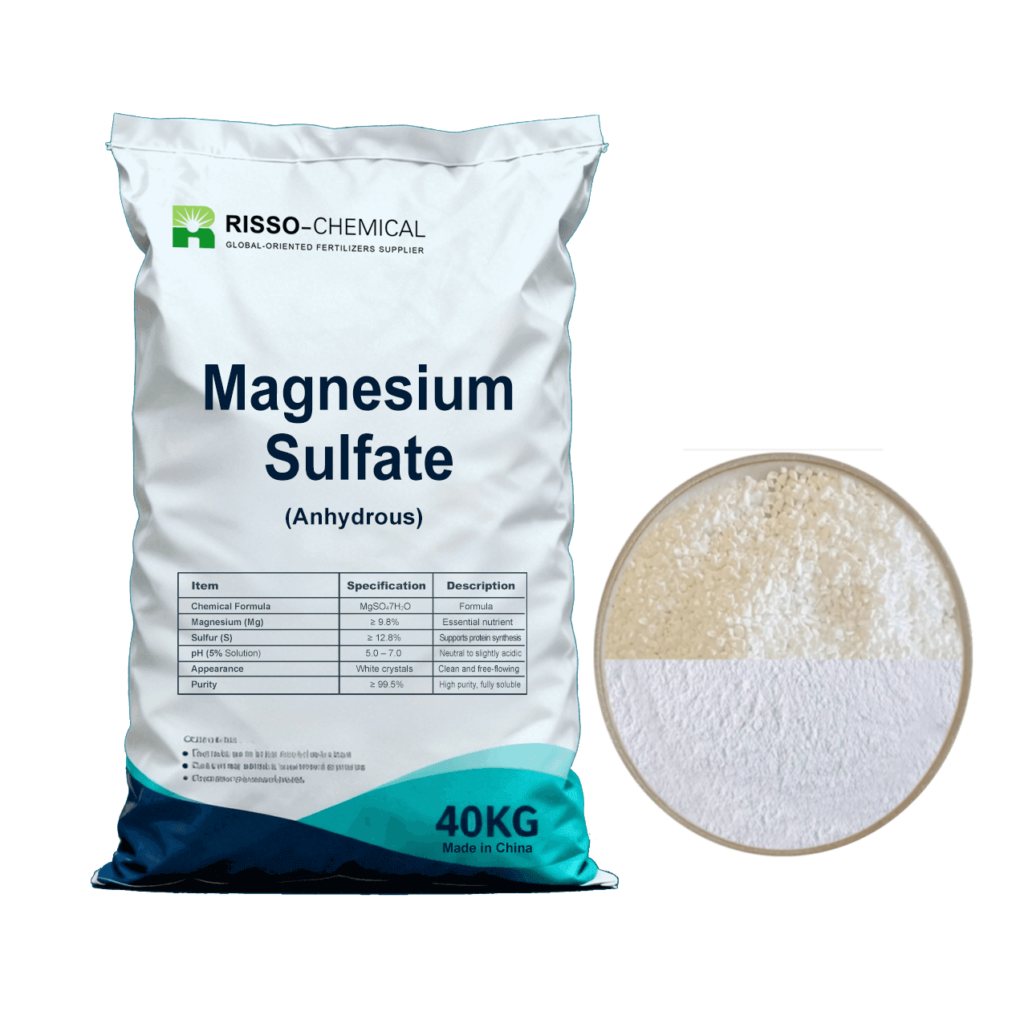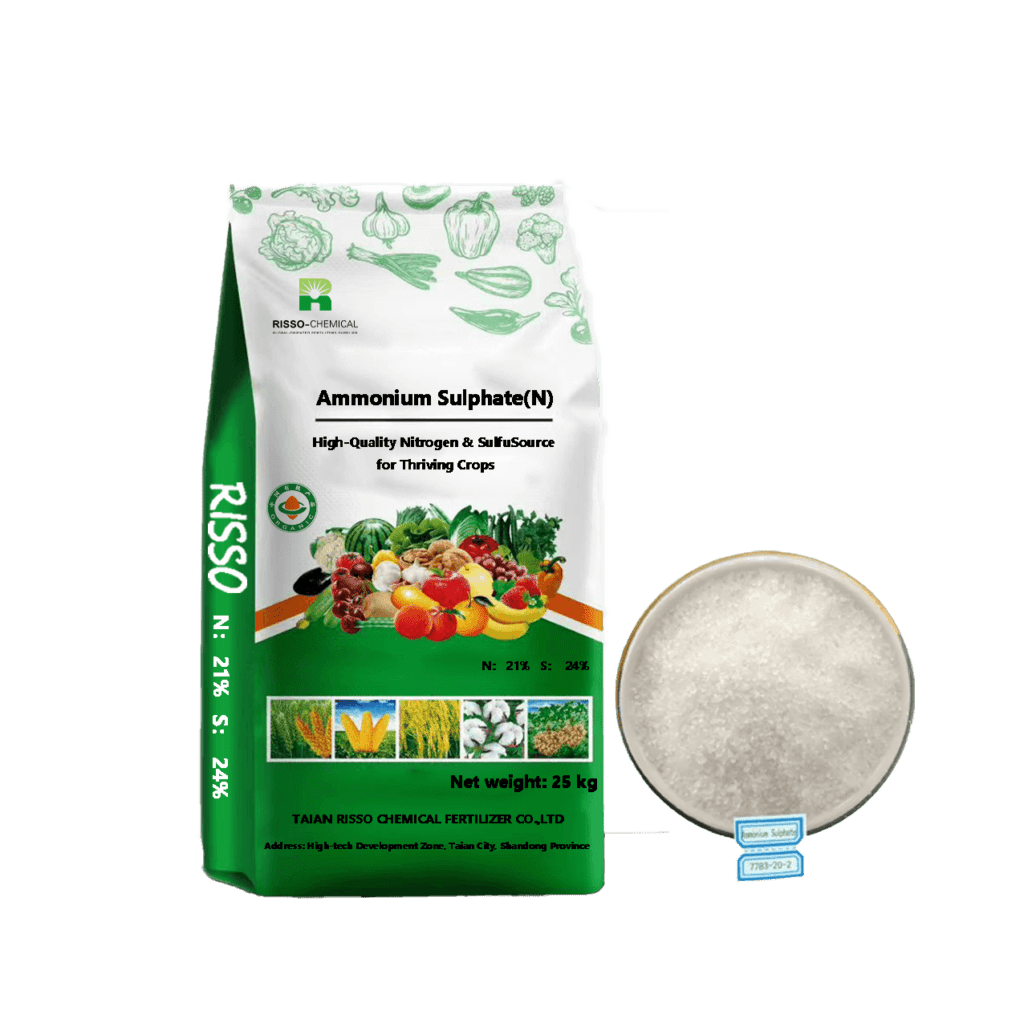Let more growers get greater benefits
What are the benefits of using ammonium sulfate fertilizers?
- Industry News
- October 22, 2017
- 10:30 am
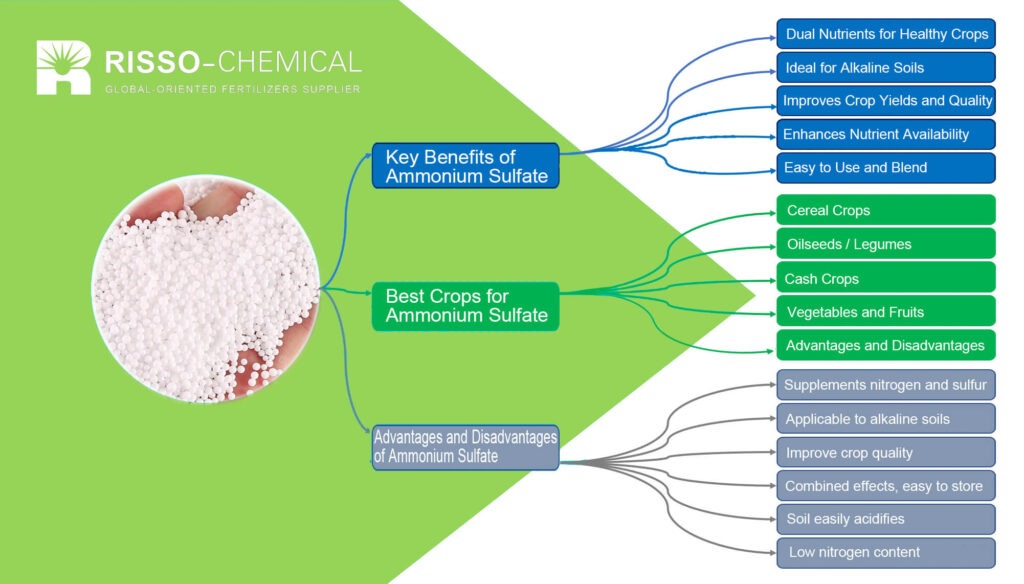
Ammonium Sulfate fertilizer is a trusted choice for farmers seeking to boost crop yields and improve soil health. Known for its dual benefits of nitrogen and sulfur, this fertilizer plays a vital role in addressing nutrient deficiencies, especially in alkaline or sulfur-deficient soils. In this comprehensive guide, we’ll cover ammonium sulfate’s composition, key benefits of ammonium sulfate, the crops it suits best, its application tips, and how to maximize its potential in sustainable agriculture.
List of Contents
1. What is Ammonium Sulfate Fertilizer?
Ammonium sulfate fertilizer (chemical formula: (NH₄)₂SO₄) is a granulated, water-soluble fertilizer that delivers:
- 21% Nitrogen (N): Vital for plant growth, chlorophyll production, and lush foliage.
- 24% Sulfur (S): Enhances nutrient absorption, protein synthesis, and crop quality.
Its unique composition makes ammonium sulfate an excellent choice for farmers needing a balanced supply of nitrogen and sulfur while improving soil fertility.
- How much does ammonium sulfate fertilizer cost?
- Ammonium sulfate composition and uses
2. Composition of Ammonium Sulfate
Ammonium sulfate fertilizer is recognized for its consistent composition, which includes:
- Nitrogen (N): 20.5–21%
- Sulfur (S): 23.5–24%
- Appearance: White or colorless granules/crystals, easily soluble in water.
3. Key Benefits of Ammonium Sulfate Fertilizer
a. Dual Nutrient Supply: Nitrogen and Sulfur
Nitrogen promotes rapid vegetative growth, while sulfur enhances enzyme activation, nutrient absorption, and crop resilience. For farmers looking to increase protein content in cereals or oil levels in seeds, ammonium sulfate is an excellent choice.b. Ideal for Alkaline Soils
One of the standout features of ammonium sulfate is its ability to lower soil pH. This makes it particularly effective for crops grown in alkaline or calcareous soils, where nutrient availability is often limited.c. Boosts Crop Quality and Yield
Whether it’s cereals, oilseeds, or cash crops, ammonium sulfate consistently improves yield and quality. For instance, its sulfur content enhances oil production in canola and mustard while improving protein levels in wheat.d. Improved Nutrient Uptake
By lowering soil pH and enhancing nutrient availability, ammonium sulfate ensures efficient absorption of vital nutrients like phosphorus and potassium, resulting in healthier, more robust plants.e. Versatile and Reliable
Ammonium sulfate’s granulated form ensures even distribution and blends well with other fertilizers, making it a reliable option for a variety of crops and farming systems.4. Best Crops for Ammonium Sulfate
Ammonium sulfate is suitable for a wide range of crops, particularly those requiring both nitrogen and sulfur for optimal growth.
- Cereal Crops: Wheat, rice, and barley thrive with ammonium sulfate, benefiting from improved protein content and grain quality.
- Oilseeds: Canola and sunflower see enhanced oil production and better overall yields.
- Legumes: Crops like soybeans and peanuts benefit from better nitrogen fixation and pod development.
- Cash Crops: Sugarcane and cotton exhibit improved growth and product quality with ammonium sulfate applications.
- Vegetables and Fruits: Onions, garlic, citrus, and grapes respond well to the fertilizer, showing better bulb formation and fruit quality.
5. How to Apply Ammonium Sulfate for Maximum Benefits
To maximize the benefits of ammonium sulfate, consider these application tips:
- Soil Testing is Key: Always perform a soil test to determine the pH and nutrient levels before application.
- Timely Application: Apply ammonium sulfate during planting or as a top-dress in the early growth stages for optimal nutrient uptake.
- Balanced Nutrition: Blend ammonium sulfate with other fertilizers, such as urea, potassium chloride, or DAP, to meet the specific needs of your crops.
- Avoid Overuse: Follow recommended application rates to prevent soil acidification and salt buildup in poorly drained soils.
These practices ensure sustainable use and maximize both economic and environmental benefits.
6. Advantages and Disadvantages of Ammonium Sulfate
Advantages:
- Provides nitrogen and sulfur in a single application.
- Effective for crops in sulfur-deficient or alkaline soils.
- Promotes protein synthesis, oil production, and nutrient absorption.
- Stable and easy to store; blends well with other fertilizers.
Disadvantages:
- Acidifies soil over time, which may require lime application in neutral or acidic soils.
- Lower nitrogen content compared to urea (21% vs. 46%), making it less cost-effective for high nitrogen-demand crops.
- Over-application can lead to salt accumulation in poorly drained soils.
7. Environmental Impact and Sustainability
Ammonium sulfate is considered environmentally friendly when applied responsibly. Its lower volatilization compared to urea minimizes nitrogen loss and reduces greenhouse gas emissions. However, farmers must avoid overuse to prevent soil acidification and water contamination, ensuring long-term soil health.
Conclusion
Ammonium Sulfate fertilizer is a versatile and effective option for farmers looking to improve crop yields, enhance soil fertility, and address sulfur deficiencies. While it may have some limitations, proper application and a clear understanding of soil and crop needs can help you maximize its benefits. From wheat fields to citrus orchards, ammonium sulfate is a reliable choice for sustainable agriculture.
Ammonium Sulfate Related Products
If you want to know other questions about Ammonium Sulfate, please contact us and we will provide professional answers.
- Article
What will you get when touch?
✔ Quick & helpful reply within 6 hours.
✔ Tailored solutions for your project.
✔ One-stop product, tech, market
TRENDING
Want to find a China fertilizer manufacturer?
Risso will be your best choice; send us your request for your fertilizer details requirement
TAIAN RISSO CHEMICAL FERTILIZER CO.,LTD.
- Address: High-tech Development Zone, Taian City, Shandong Province
© Copyright 2017 RISSO CHEMICAL. All Rights Reserved.



